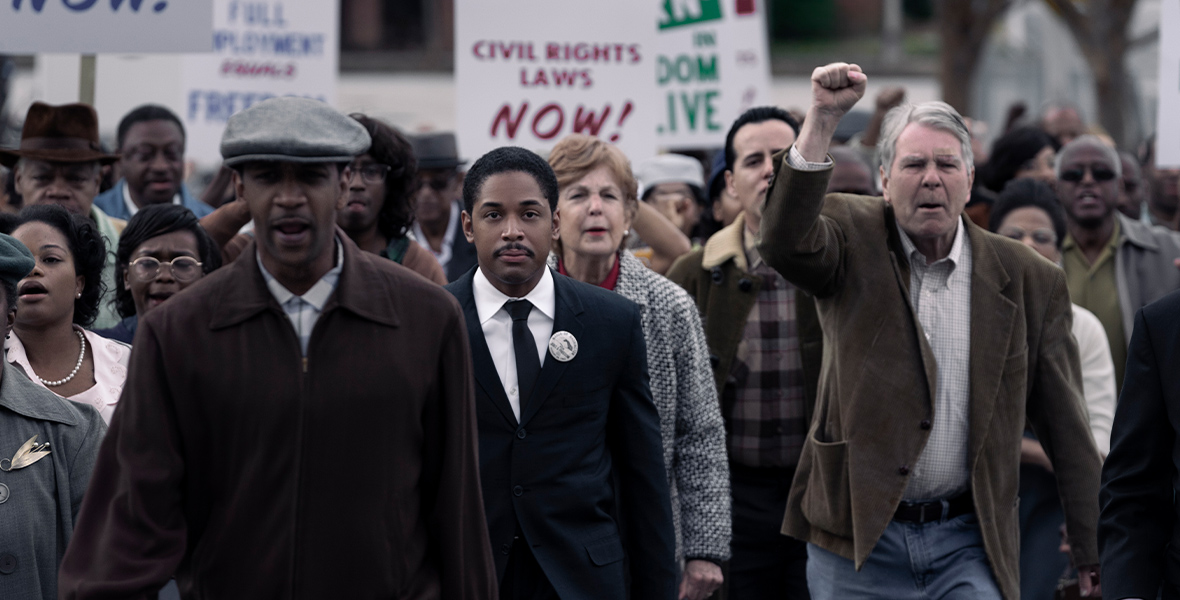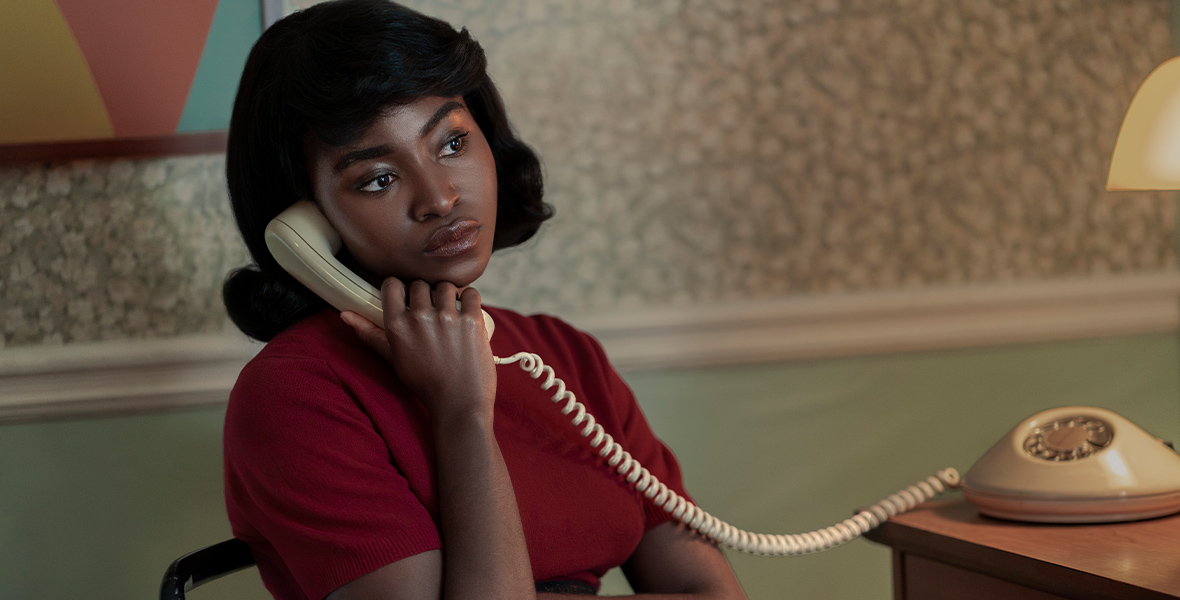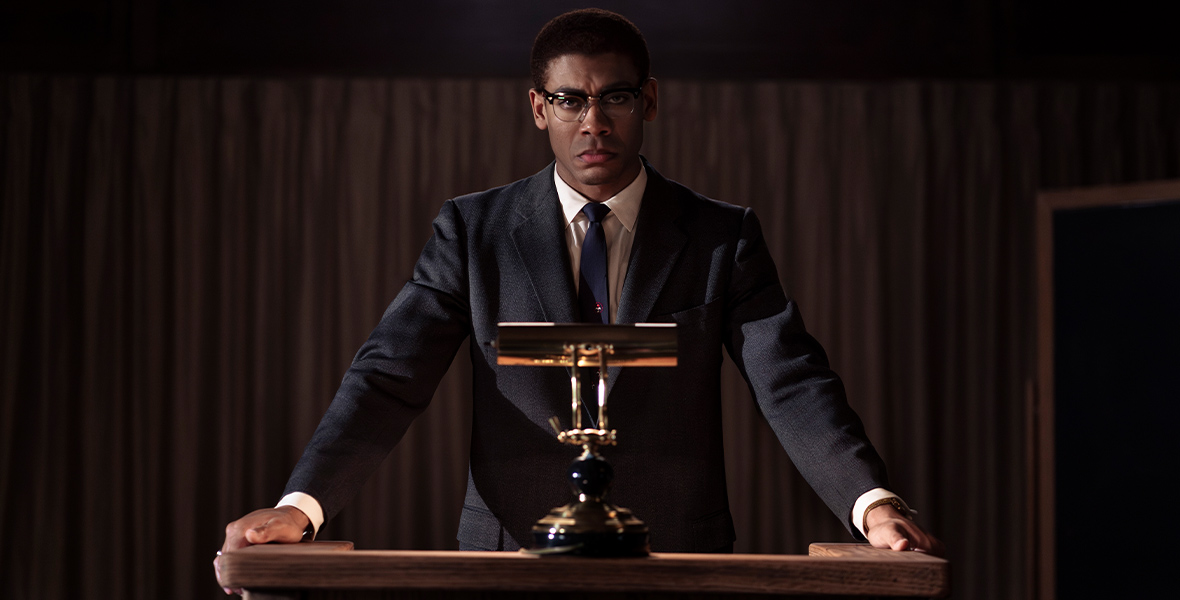By Zach Johnson
In a franchise first, National Geographic’s Emmy® Award-winning anthology series Genius features two subjects, Dr. Martin Luther King Jr. (Kelvin Harrison Jr.) and Malcolm X (Aaron Pierre), whose dueling philosophies helped usher the United States through the Civil Rights Movement.
Premiering Thursday, February 1, at 9 p.m. ET/PT on National Geographic, Genius: MLK/X chronicles the pair’s formative years, shaped by strong fathers and traumatic injustices, and traces their parallel paths to become the change they wished to see in the world. The eight-episode docudrama series gives viewers an intimate look into their complex lives as husbands, fathers, brothers, and sons, while also bringing their wives, Coretta Scott King (Weruche Opia) and Dr. Betty Shabazz (Jayme Lawson)—often cast as peripheral figures—to the forefront of the Civil Rights Movement.
“Growing up, so often we were told that we had to choose between Martin and Malcolm: ‘Who do you identify with? Who do you want to follow?'” executive producer Gina Prince-Bythewood said Monday during a post-screening premiere Q&A, hosted at the Samuel Goldwyn Theater in Beverly Hills. “But we knew that they were both integral to the Movement. They both had the same goal; they just had different means of going about it. The more we got into the research, the more we realized how close they were coming to each other towards the end of their lives, so we really wanted to be able to tell that story.”
Both men left profound legacies that remain resonant. “We need heroes,” said executive producer Jeff Stetson, whose play, The Meeting, inspired the series. “And they were heroes.”

“This country has a tendency to pit one leader against each other, and it reduces complex issues in very simple ways…” Stetson said. “They saw Martin as the dreamer, who saw freedom and justice through nonviolence, and they saw Malcolm as the revolutionary, who saw freedom by any means necessary.” What many have yet to realize, Stetson argued, is that “no dreamer who wants justice [fails to] understand that it comes with a revolution, and no revolutionary can be a revolutionary without understanding the vision of a dream.”
In order to deftly depict that dichotomy, it was imperative that creative team cast the right people to play the formidable duo. Harrison confessed he was initially reluctant to portray King. “I was like, ‘I haven’t lived enough,'” he said. “They came back to me and said, ‘Read the first episode at least.’ I did, and then I met with them and I expressed my imposter syndrome—this feeling that I haven’t earned it. They said, ‘Dr. King was so young when he started all this…’ So, you look at that and you go, ‘OK, he also probably didn’t know what was next. He also was terrified. He also had anxiety, and fear, and a sense of imposter syndrome… They said, ‘Lean into that. That is going to offer us a tangible take on Dr. King.'”
Like Harrison, Pierre immersed himself in research to get a better understanding of his role. “I’m always in pursuit of truth, of authenticity,” he said. “That was definitely a key objective.”

Both Opia and Lawson said they felt a responsibility to craft three-dimensional, fully realized performances befitting of the impressive women they portrayed. “It’s been such a revelation, because I didn’t know that much about Coretta Scott King,” Opia admitted. “I knew her as ‘the wife of.’ For me, more than anything, this whole process was an education. I was ashamed that I didn’t know as much as I do now, but it was wonderful to engage and to learn, and to be part of the process to educate more people—especially younger generations. They are huge shoes to fill, and I never could. I can only do my interpretation.”
Like her costars, Lawson said she was determined to tell Shabazz’s story with care and respect. “Growing up, I was always aware of the misinformation [surrounding] Malcolm,” she said. “When I was trying to find sources on Dr. Betty Shabazz, I needed to be very specific to find credible sources. I exhausted my research to make sure the information I was getting could be trusted.” In addition to a biography, she continued, “There was one book that really stuck out to me—a children’s book called Before Betty X that one of her daughters wrote, fictionalizing the life of their mother from the time she was born up until her early teens. And the moment I got that book, I said, ‘I found her,’ because I found the little girl. And as a woman, I think we all carry the little girl into every room we walk into.”

That level of dedication and preparation helped each actor prepare for the quieter moments that occur between pivotal historical events. The two leaders, and those closest to them, at times questioned their resolve and their decisions—and they did so while trying to balance their public personas with their private lives. By approaching the series “as an eight-hour film,” Prince-Bythewood explained, “it gave us the space to really open it up and ‘take them off the T-shirts,’ as we say—to make them real, to show the full breadth of their humanity. That included not only Malcom and Martin, but Betty and Coretta as well.”
ABC will broadcast the first episode of Genius: MLK/X Thursday, February 1, at 9 p.m. ET/PT, and National Geographic will debut two new episodes each Thursday through the end of February. Episodes will be available to stream next day on Disney+ and Hulu.


